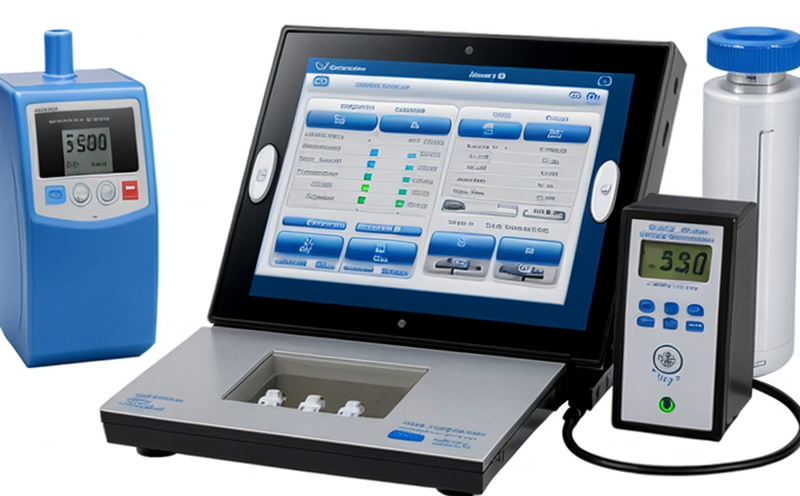Thermal Shock Resistance Testing for Infusion Systems
The thermal shock resistance testing of infusion systems is a critical aspect in ensuring medical devices are capable of withstanding environmental conditions that could affect their performance and safety. This test evaluates the ability of an infusion pump or drug delivery system to maintain its integrity, functionality, and accuracy under extreme temperature changes.
In this context, the infusion pump acts as a lifeline for patients requiring precise dosing of medications or fluids. Therefore, ensuring it can withstand sudden variations in ambient temperatures is paramount. The test involves subjecting the device to rapid temperature cycling between two specified limits. This process simulates real-world conditions that could occur during transportation and use.
The primary goal of this testing is to identify potential weaknesses in the design or manufacturing process of the infusion pump, which might lead to malfunctions under adverse conditions. The test setup typically includes a thermal chamber capable of reaching temperatures well below freezing and well above body temperature. Specimens are placed inside this chamber where they undergo repeated cycles of heating and cooling.
The testing procedure involves several key steps:
- Preparation: Calibration of the infusion pump to ensure it meets the required specifications.
- Placement: The device is carefully positioned within the thermal chamber.
- Cycling: Rapid temperature changes are applied according to predefined protocols. These could range from -40°C to 60°C or similar ranges as specified by relevant standards like ISO 17895-3 for medical devices.
- Observation: The device's behavior during and after each cycle is closely monitored.
The acceptance criteria are stringent, ensuring that the infusion pump maintains its operational parameters within acceptable limits. This includes checking for leaks, checking the accuracy of dosage delivery, verifying the integrity of connections, and confirming that the pump can resume normal operation without issue following each cycle.
Understanding the importance of this testing is crucial for quality managers and compliance officers who must ensure regulatory requirements are met. For R&D engineers, it provides insights into potential design improvements to enhance durability and reliability. Procurement teams benefit from knowing which suppliers deliver products that meet stringent performance standards.
Why It Matters
The significance of thermal shock resistance testing for infusion systems cannot be overstated. Compliance with these tests ensures patient safety by reducing the risk of device failures during critical medical procedures. Failure to pass this test could lead to inaccurate dosing, which might result in over-administration or under-administration of medication.
From a regulatory standpoint, adherence to such testing is mandatory for the approval and certification of infusion pumps and drug delivery systems. Regulatory bodies like the FDA (US), the EMA (EU), and others worldwide mandate rigorous quality control measures including thermal shock resistance tests as part of their clearance processes.
Manufacturers who fail to meet these standards risk recalls, fines, and reputational damage. Moreover, they could face legal challenges from patients or healthcare providers if a device malfunctions due to inadequate testing.
The broader implications extend beyond individual devices; they impact the entire healthcare ecosystem. By ensuring that infusion systems are robust enough to handle temperature variations, hospitals can maintain high standards of care, reduce errors, and improve patient outcomes.
Industry Applications
- Hospitals: Ensuring safety in critical medical settings where precise drug delivery is essential.
- Nursing Homes: Providing reliable infusion systems for long-term care facilities.
- Veterinary Clinics: Supporting accurate medication administration for animals.
- Field Hospitals: Maintaining functionality during emergency situations where environmental conditions can be unpredictable.
Thermal shock resistance testing is not only essential in healthcare settings but also in other areas where medical devices are used. The robustness of infusion systems ensures they can operate effectively under various climatic conditions, enhancing the overall quality of care provided globally.
Use Cases and Application Examples
In use cases involving long-distance transportation of medical equipment, thermal shock resistance testing is crucial. For instance, during the transport of infusion pumps to remote areas or disaster zones, these devices may encounter extreme temperature changes. Ensuring they can withstand such conditions guarantees continuous operation without interruption.
Another application involves field-deployed devices used in military and emergency response scenarios. These environments often have variable temperatures which could affect the performance of medical equipment. By undergoing thermal shock resistance testing, manufacturers can ensure their products are reliable under these challenging circumstances.
The example of a patient being transported from one facility to another further illustrates the importance of this test. If an infusion pump fails due to temperature variations during transit, it could lead to serious consequences. Thus, rigorous testing is indispensable for maintaining high standards in healthcare delivery.





